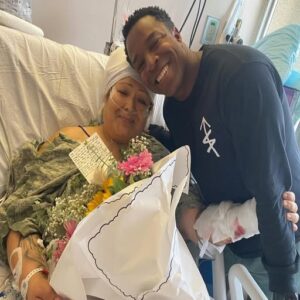That Wednesday should’ve been my grandparents’ 50th.
Two years earlier, my grandpa Torin had stepped into the garden humming Patsy Cline and never came back inside. A stroke—sudden and final. It hollowed my grandma, Mira. They’d loved each other since she was seventeen: two people who split dessert, slow-danced to TV commercials, and never crossed a room without reaching for the other’s hand.
Last year she lit a candle beside his photo and sat with him in the quiet. This year she said, “Liora, I want to go back. To the restaurant where we always went. Just once more.”
She put on her best blue blouse and the pearl pin he’d given her on their twenty-fifth. She caught a bus downtown, ordered their “usual”—ribs with mashed potatoes, a lasagna to share, a pecan pie “for Torin.” She laughed at a memory, cried into her napkin, tipped twenty percent, and stood to leave.
Then a young server approached, waving the receipt like a flag.
“Is this enough, grandma?” she said, voice loud enough to turn heads. “You sat here all night. Used up my section. And this is my tip? Pathetic.”
My grandmother tried to explain—the bus fare, the tradition, the pie—but the server leaned closer.
“No wonder you’re alone at your age. Maybe if you weren’t so cheap, someone would’ve stayed.”
The next morning Grandma told me the story with trembling hands. When she reached the part about walking eight blocks home because she’d handed over the last bills in her purse—even her bus money—to stop the shaming, something in me locked into place. Not rage, exactly. Resolve.
“No one does this to you,” I said. “Not once.”
I called the restaurant. “We’d like a table Saturday,” I told the manager, sugar in my voice. “Could we sit with Kiera? She treated my grandmother like royalty last time.”
“Wonderful to hear,” he said, pleased.
Then I called my friend Soren, a photographer. “Bring your camera,” I told him. “We’re going to deliver justice with a bow on top.”
We dressed like we belonged under a chandelier and walked in Saturday night as if the evening were ours. Kiera spotted us and turned on a smile bright enough to tan fruit.
“Wine?” she asked. “Perhaps a red blend—”
“Your best,” I said. “Thank you.”
We ordered big. We thanked her every time she set down a glass. I performed warmth I didn’t feel. She basked.
Dessert arrived—pecan pie, of course. I set an envelope on the table and slid it toward her.
“You’ve been wonderful,” I said. “We wanted to leave something extra.”
Her eyes gleamed. She opened it. The gleam dimmed. Inside were folded white napkins, each with a sentence in black ink.
“Excuse me,” I said, lifting my glass. “A toast.”
Conversations softened around us. Chairs stilled. I unfolded the first napkin and read, steady and clear.
“Thank you, Kiera, for treating my grandmother—who sat here alone on what should have been her fiftieth anniversary—with such kindness. She wore his pearl pin. She ordered their meal. She tipped what she could. You called her cheap and told her that’s why she deserved to be alone.”
Murmurs rippled through the room. Kiera didn’t move.
I opened the next.
“This woman raised children, buried the love of her life, and still shows more grace on a bad day than most of us manage on a good one. You tried to take that from her.”
I lifted the last napkin, the ink slightly blurred from the tears I’d shed while writing it.
“She’s a widow, not a tip. Be kinder.”
I placed the envelope back in front of her. “That’s your tip tonight,” I said quietly. “Do better.”
We stood. Soren took one photograph—not for the internet, but in case anyone needed to know what happened—and we left.
That night I emailed the manager: times, details, the photo, my grandmother’s name. At dawn he wrote back: “I am so sorry. This is disgraceful. Kiera is no longer employed here. Dinner is on us whenever you wish.”
The next weekend I asked Grandma to go back with me. She hesitated at her dresser, touching the pearl pin. “Maybe I shouldn’t wear it,” she said, half-hiding it beneath her sweater.
“Wear it,” I said. “It’s yours.”
At the restaurant, our corner table held a small bouquet. A new server, Rowan, greeted Grandma without a trace of pity—just warmth. He set down a few extra napkins without comment when her eyes filled, and later slid a box across the table. “A slice of pecan pie for Torin,” he said softly.
Outside, under the clean bite of evening air, Grandma paused before boarding the bus. She squeezed my arm.
“I felt him tonight,” she whispered.
I squeezed back. “He’d be proud you came. He’d be proud you stayed.”
She smiled, the kind that lives in the eyes first. “And you, love,” she said. “He’d be proud of you, too.”
We climbed onto the bus and sat side by side. Through the window, the restaurant glowed—the corner table, the bouquet, the soft place carved out for a fifty-year love. It wasn’t about punishment anymore. It was about returning something that should never have been taken: dignity, and the simple kindness that lets a person sit with their grief and be seen.





